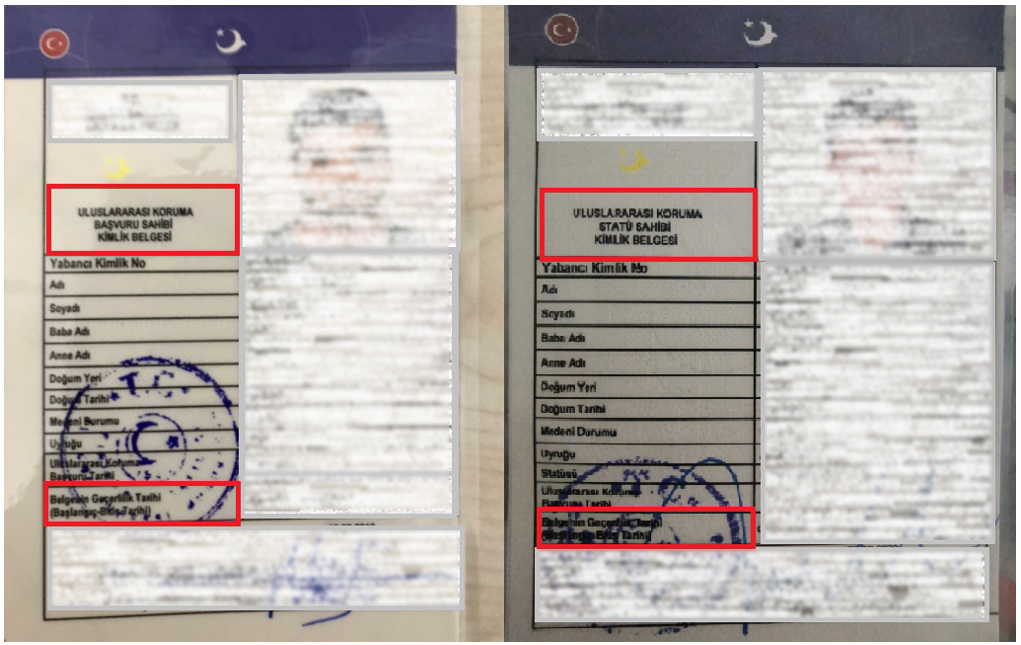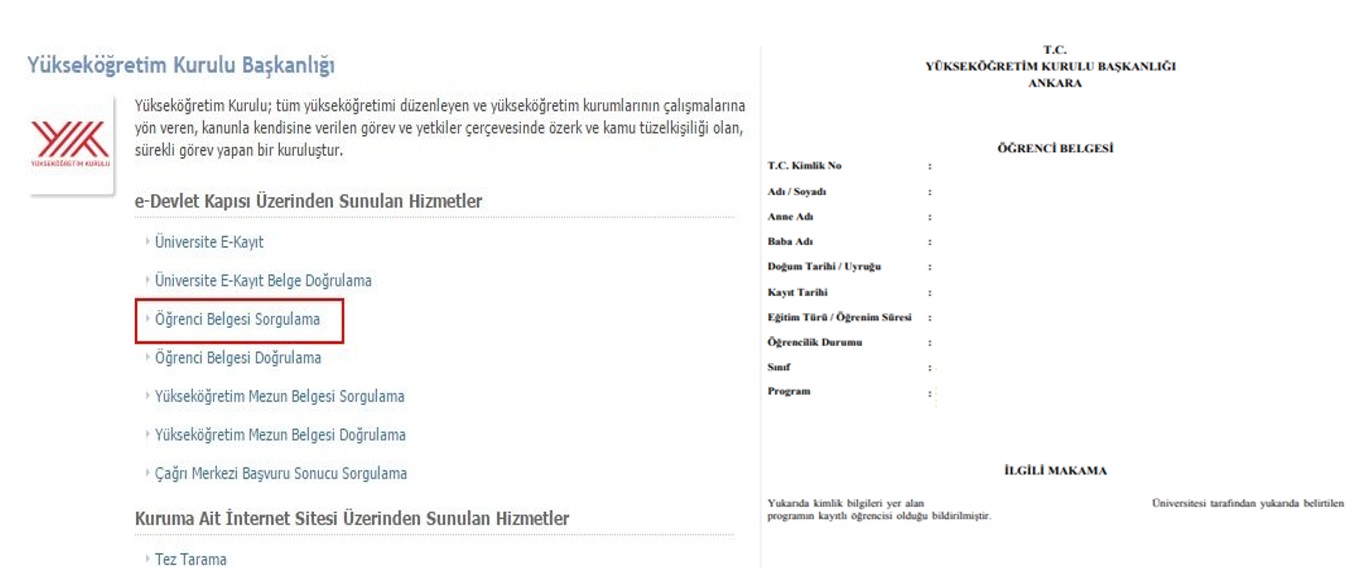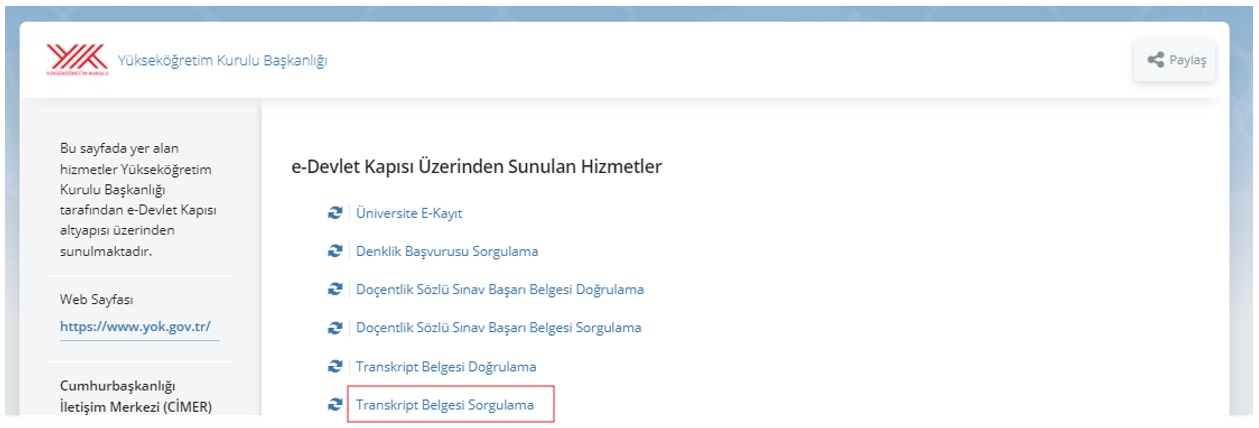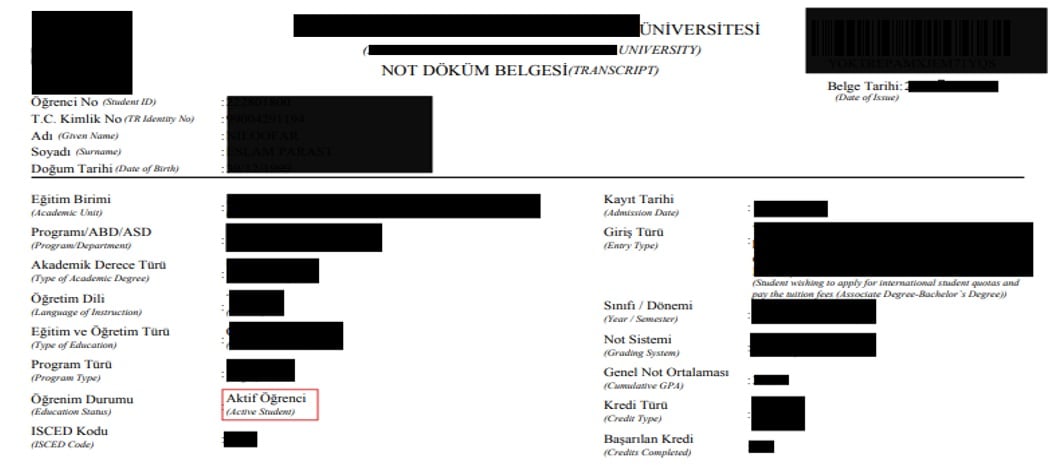Education
According to Turkish national law, all children in Türkiye, including foreigners (as well as international protection applicants, international protection status holders, and those under temporary protection), have the right to receive primary and secondary school education free of charge. In addition to being crucial for children’s development and social cohesion, education also fosters cognitive growth and improves language skills. Furthermore, education will help children to navigate challenges, including displacement.
It is important for children to attend school, no matter how long you expect to stay in Türkiye! Even if you hope to be resettled to another country or to go back to your country, it is important that you and your family use the time in Türkiye to develop the skills that will help your children integrate socially and academically into a new education system. The longer your children are out of school, the more difficult this becomes.
Formal Education in Türkiye is:
- Compulsory
- Free,
- Implemented with 4+4+4 system,
- Imperative for parents to register their children in school and ensure their attendance until the completion.
You have to ensure that your child is registered in a school. But registration is not enough, continuity is also significant!! Failure to do so may result in significant penalties for you. Remember, a lack of proficiency in Turkish should not hinder your access to education.
It’s crucial for every child to continue to high school. In addition to regular high schools, there are also vocational high schools where your child can gain practical skills for a profession, where they have the opportunity to acquire technical and vocational skills. Vocational and technical education at the high school level is given through institutions like Vocational and Technical Anatolian High Schools, Multi-Programme Anatolian High Schools, and Vocational Training Centers (MESEM). If your child in enrolled in these schools, they can benefit from the PIKTES+ (Promoting Inclusive Education for Kids in the Turkish Education System) Programme. Further information about PIKTES is available below.
If you have a child with specific needs, you should apply for Counseling and Research Centers (RAM). You can find the list for RAMs: orgm.meb.gov.tr/alt_sayfalar/kurum.asp. Prior to seeking assistance from RAM, obtaining a ÇÖZGER (Special Needs Report for Children) is essential to ensure appropriate referrals.
How to enroll your child in school?
You have to apply to the closest Turkish school or District National Education Directorate (DNoNE), or for some provinces Provincial Directorates of National Education (PDoNE). You can find the schools that your child can enroll through e-okul system. You can find E-Okul System: https://e-okul.meb.gov.tr/
Needed documents for school enrollment are as follows:
- Valid international protection applicant ID or international protection status holder ID or temporary protection ID which are given Provincial Directorates of Migration Management (PDMMs),
- Residence registration (not mandatory, is it needed if there is not information in the national data base. You can take it from Birth Registry Office, or Mukhtars),
- Other documents needed by Schools (equivalence document, transcript, diplome etc… )
E-Equivalence
If you possess any documents from your child’ previous education life, your child will be subjected to an equivalence processes. This online process entails the following steps:
- You should follow the guidance on https://edenklik.meb.gov.tr/?culture=tr-TR and upload the relevant documents,
- Upon completion of the application, you will receive an appointment with a designated date and time,
- Ensure your availability at the scheduled appointment date and time,
- Bring all necessary document to your appointment date and time,
- The Equivalence Center will review the documents, and will decide based on the opinion of the Board of Education and Discipline,
- The Equivalence Center may render one of three decisions: acceptance, rejection or requirement for a placement test.
Please be aware that Equivalency Centers within PDoNEs/DNoNEs may take some time to forward your documents to the Central Office for review by the Board of Education and Discipline due to their heavy workload. It is crucial that all documents are notarized. Additionally, the Equivalence Center may request supplementary documents if necessary.
In cases where you lack document due to the circumstances such as was, disaster, or asylum procedures:
- Your child may undergo a placement test.
- Primary school children are exempt from the placement test, and determination will be made based on families’ verbal statements.
PIKTES+
The Catch-Up Trainings under the PIKTES+ Project aim to offer educational support to students seeking to enhance their Turkish literacy skills, including those who are completely new to the language. These classes, along with all other initiatives within the project, are accessible to children under international protection and temporary protection.
Furthermore, as part of the PIKTES+ Project, Vocational and Technical Education Scholarships are available to international students, including those under international protection and temporary protection, as well as Turkish citizens who are studying in Vocational and technical education at the high school level. PIKTES+ offered these scholarships to students in grades 9 through 12. For updates on scholarship opportunities, please visit the following link: https://piktes.gov.tr
Financial Support for Education (From Kindergarten to 12th Grade)
Conditional Cash Transfer for Education (CCTE) for Foreigners Programme is implemented by the Ministry of Family and Social Services (MFSS), the Ministry of National Education (MoNE), and the Turkish Red Crescent. Children under international protection and temporary protection can also benefit from this programme. This programme is the extension of the Conditional Cash Transfer programme for Education, which has been implemented by MFSS since 2003 for Turkish citizens living in Türkiye. Under this programme, cash assistance is provided to families whose children (from kindergarten to 12th grade) regularly attend school, provided one they meet the criteria. Applicants must be registered with the PDMMs, have a foreign identity number starting with 99, and be registered in the MERNIS database. Applicants must meet the eligibility criteria of the programme and send their children to school regularly to receive payments regularly. The eligibility criteria are as follows:
- Being under temporary protection or international protection in Türkiye and living outside of camps,
- Being deprived of income and social security at the time of application,
- Having at least one child attending school in the family.
If you wish to apply for this program, please approach the Social Assistance and Solidarity Foundation (SASF) or the TRC Service Centers (SC) in your province or district. If you move to a new address, promptly inform the SASF or SC in your current province or district to ensure uninterrupted assistance.
UNIVERSITY EDUCATION
ADMISSION TO UNIVERSITY
If you are under international protection (i.e., international protection applicant, international protection status holder) and wish to pursue a university education in Türkiye, you have the opportunity to attend Turkish universities. The first step is to take the International Student Admission Exam (TR-YÖS), administered centrally by the Center for Evaluation, Selection, and Placement (ÖSYM) twice a year. Announcements and information regarding the exam can be found on the ÖSYM website (https://www.osym.gov.tr). Tuition fees vary among universities and depend on the chosen program and faculty. Additionally, students should budget for local transportation, books, and living expenses.
Students who want to enroll in associate’s and bachelor’s degree programs in Türkiye must meet the following criteria:
- Possess a valid Foreigner Identification Number issued by PDMM (Provincial Directorate of Migration Management) (99 number) either as international protection applicant or international protection status holder.
- Have completed the 12th grade and provide proof of completion.
- Take the TR-YÖS exam conducted by ÖSYM.
- Provide the required documentation.
The authority responsible for higher education in Türkiye is the Council of Higher Education (Yükseköğretim Kurulu – YÖK). The Presidency for Turks Abroad and Related Communities (YTB), through the Türkiye Scholarships Programme, provides higher education scholarships to international students. In addition, YTB offers scholarships to international students through other dedicated programmes.Information regarding university admissions and financial support is available on their websites (https://www.yok.gov.tr, https://ytb.gov.tr). Specific details about academic programs and admission requirements for international students can be found on universities’ websites.
Students who started their university studies in their country of origin (or any other country) but were not able to complete them may ask universities to recognize the credits (courses) they have passed. Each university independently decides whether to recognize these courses, and the decision may vary by department. Information on equivalence can be accessed on YÖK’s website (https://denklik.yok.gov.tr).
HIGHER EDUCATION FINANCIAL ASSISTANCE
Several organizations provide scholarships to students who are under international protection for higher education in Türkiye. These include YTB, UNHCR, the International Centre for Migration Policy Development (ICMPD), and various NGOs.
UNHCR offers the Albert Einstein German Academic Refugee Initiative (DAFI) scholarship program. DAFI scholarships cover a wide range of expenses, including accommodation, food, local transportation, study materials, registration, and tuition fees. Additionally, UNHCR provides semester-based cash grant support, known as Higher Education Cash Grants (HECG), for students under international protection enrolled in Turkish universities.
Students interested in the DAFI scholarship should monitor the UNHCR Help website for announcements and information on eligibility criteria and application processes. UNHCR also recommends that students who are interested in DAFI scholarships should also apply for the Higher Education Cash Grant (HECG) program as DAFI scholarships may not be available every year.
UNHCR offers refugee students the opportunity to apply for cash-based assistance that will contribute to meeting the costs of attending university.
HIGHER EDUCATION CASH GRANT 2025-2026 Fall SEMESTER
If you are an international protection applicant or an international protection status holder enrolled in a university or higher education institution in Türkiye, you may be eligible for higher education cash grant support from UNHCR. UNHCR announces this support at the beginning of each academic term on this page.
Eligibility Criteria:
- Possess a valid foreigner identification number issued by PMM as either an international protection applicant or an international protection status holder,
- Be enrolled in a state university or higher education institution,
- Be a student in an associate’s or bachelor’s degree program,
- Minimum 1.5 GPA (Required for ongoing students, new enrolled students are exempt)
Depending on the number of applications and budget availability, prioritization can be made based on; i) level of study; ii) field of study, and iii) academic success.
Please note that Syrian citizens under Temporary Protection, persons enrolled in evening classes, master and doctorate students and DAFI scholarship holders are not eligible for this financial assistance.
What is the amount of the financial assistance?
The amount of the financial assistance per semester is
- 6900 TRY for Associate Degree (2-years programmes)
- 12400 TRY for Bachelor’s Degree (4-years programmes)
- 15500 TRY for Bachelor’s Degree (5-6-years programmes*)
*5-6 years programs include Medicine, Pharmacy and Dentistry.
How do I apply for the UNHCR higher education financial assistance?
To apply, please visit our online application page, where you will be able to complete the form electronically and upload all supporting documents. You can request assistance from one of UNHCR’s partners in completing and submitting the application form.
What supporting documents do I need to include as part of my application?
In addition to the completed application form, applications must include the following supporting documents:
- Copy of your foreigner’s ID card (The validity date should not be before March 2025)
- Up-to-date student certificate (Active student certificate obtained from e-devlet after – September 1, 2025, and showing 2025-2026 Fall Semester registration)
- Up-to-date transcript (Document obtained from e-devlet after -September 1, 2025, and showing the overall GPA)
*Newly accepted students can also submit acceptance letter as student certificate.
** Transcript is required for ongoing students, new enrolled students are exempt.
Please note that only fully completed applications will be reviewed.
ID CARD

In order to be accepted to the program, your ID CARD should be:
- INTERNATIONAL PROTECTION APPLICANT or AN INTERNATIONAL PROTECTION STATUS HOLDER
- The expiry period of the validity date should not be earlier than 01.09.2024
Temporary protection documents, residence permits, other country passports will not be accepted.
International Protection Applicant and International Protection Status Holder identities expiring before 01.03.2025 will not be accepted.
STUDENT CERTIFICATE

In order to be accepted to the program, the student certificate should be an official document.
- Obtained from e-devlet
- Containing name / surname, university, department information
- Up to date (showing that you are registered in 2025-2026 Fall term)
- Showing CONTINUED STUDENT or ACTIVE STUDENT status
Documents that do not include name / surname, university, department information, received before September 2025 and / or with “PASSIVE”, “NOT REGISTERED” and “FROZEN” status will not be accepted.
TRANSCRIPT


To be accepted to the program, the transcript should be an official document.
- Obtained e-devlet
- Containing name / surname, university, department information
- Up to date (including 2024-2025 Spring term grades)
- Showing GANO/cumulative GPA
Documents that do not show the name / surname, university, department information, 2024-2025 Spring term grades and GPA / Cumulative GPA will not be accepted.
* Those who register in the 2025-2026 Fall term are exempt from transcript. All applicants whose enrollment date is before 2025-2026 Fall semester must upload a transcript.
What is the application period?
The application deadline is October 31, 2025.
Please note that UNHCR cannot process applications received after October 31, 2025.
What are the prioritization criteria?
In principle, higher education cash assistance is provided to all eligible applicants. However, depending on the number of applications and budget availability, prioritization can be made based on i) level of study; ii) field of study, and iii) academic success.
Level of study: Students studying shorter programmes will be prioritized.
Field of study: Students studying departments with high potential to future employment will be prioritized.
Academic success: Students with higher GPA will be prioritized.
How will I learn the result of my application?
Unsuccessful applicants are informed of UNHCR’s decision through e-mail.
Successful applicants are notified of the outcome of the process through receipt of an SMS from PTT indicating that funds are available for withdrawal.
How will I receive the grant?
Payments will be made through a debit card, issued by PTT on behalf of UNHCR. This debit card can be used to withdraw cash from branches and ATMs and to make purchases in any shop that accepts MasterCard.
I am newly accepted to a university/higher education institution. Can I apply for this grant?
Yes, newly accepted students can apply to the assistance with an up-to-date student certificate as a proof of registration for 2025-2026 Fall semester.
I am newly accepted to a university/higher education institution. Can I apply without GPA and transcript?
Newly enrolled students are exempt from GPA criterion and are not required to upload transcript.
I have difficulty to obtain my documents. Can I apply for this assistance without documents?
No, all required documents should be uploaded until October 31, 2025. Only fully completed applications will be reviewed.
Can I upload the student certificate and transcript that I obtained last semester?
No, both the student certificate and transcript should be up-to-date. Student certificate should show your registration for 2025-2026 Fall semester and transcript should show your GPA by the end of 2024-2025 Spring semester.
I have difficulty to upload my documents. Where can I get support?
You can request assistance from one of UNHCR’s partners in completing and submitting the application form. Please check https://turkey.servicesadvisor.org/en for UNHCR’s partners in your province.
OTHER FINANCIAL SUPPORT
Students may also apply for the ICMPD’s EU Scholarships, provided they meet the following criteria:
- They are international protection status holders.
- They are studying in one of the designated provinces: Ankara, Kayseri, Eskişehir, Konya, Trabzon, Karabük, Samsun, İzmir, Erzurum, Adana, Mersin, Hatay, Elazığ, Gaziantep, Kilis, Şanlıurfa, Malatya, Kahramanmaraş, Diyarbakır, Mardin, Van, İstanbul, Bursa.
- They meet the success and other specified criteria.
- They are enrolled in a 4-year Bachelor’s program, a thesis or non-thesis Master’s program, or a Ph.D. program.
Information about EU Scholarships can be accessed at (https://euburs.org).
Remember that the applications of eligible candidates will be carefully reviewed by Scholarship Offices based on criteria such as academic standing, qualifications, academic interests, and participation in social activities.
It is also recommended to regularly check YTB’s Türkiye Scholarships page. Türkiye Scholarships is a comprehensive scholarship program aimed at international students in Türkiye, offering various scholarships. More information can be found at (https://ytb.gov.tr/daireler/uluslararasi-ogrenciler/turkiye-burslari).
International protection applicants, international protection status holders and those who are under temporary protection have right to attend Turkish universities. In addition to standard university option, institutions and websites providing online or distance education are listed below.
University Education:
If you want to study at a university in Türkiye, you can benefit from distance learning opportunities. Distance learning is a type of university education where there is no obligation to come to campus, and you can follow course modules in a virtual environment.
Anadolu University offers extensive options in distance learning. To study at Anadolu University, you need to take an entrance exam and pay tuition fees. Degrees and diplomas awarded by Anadolu University are recognized in Türkiye and internationally. Ankara University, Istanbul University and Atatürk University also offer university education through distance higher education programmes.
Online Education at Formal Education Level:
It is possible to study primary and middle school through distance learning.
Ministry of National Education Distance Education Website provides free online support for primary and middle school students with online books.
Certificate Programmes and Other Online Education Opportunities:
Universities in Türkiye also offer online certificate programmes. Boğaziçi Üniversitesi has distance education programmes in foreign languages and professional fields. Other universities offering online certificate programmes can be explored from there.
YTB Akademi offers online courses in Turkish language, English at the A1 level, stress management, teamwork, and resume preparation.
Istanbul Municipality Distance Learning Platform offers distance learning opportunities in various vocational fields. These courses cover various vocational fields such as database design, wood painting, and clothing tailoring.
Institutions like University of the People, Coursera, Udemy and others offer online programmes. Most of these programmes are not officially recognized in Türkiye, but they are useful for refreshing knowledge and preparing for university.
Non-formal education is a lifelong education model. It is purpose-oriented, with a curriculum, but different from formal education. In Türkiye, non-formal education is provided at Public Education Centers (PEC) under the Directorate General for Lifelong Learning of the Ministry of National Education.
At PECs, skill acquisition and vocational and technical education courses are provided free of charge. To register for these courses, you need to have either your International Protection Identity or Temporary Protection Identity. There must be at least 12 people for the courses to be opened.
UNHCR Türkiye supports vocational and technical courses such as textiles, embroidery, cooking, pastry making, dry cleaning, shoemaking, hairdressing, ceramics, jewelry craftsmanship, carpentry, and pearls craftsmanship in more than 35 Public Education Centers in 20 provinces. Therefore, by participating in such courses, you can prepare for a profession, develop work habits, become an active producer, and even acquire enough knowledge and skills to work in a workplace or establish your own business. Additionally, municipalities can also provide vocational and technical education courses.
Learning Turkish is a fundamental skill for sustaining your life during your stay in Türkiye. Learning Turkish will facilitate daily life and simple tasks (such as shopping, using public transportation), enable friendships with other individuals living in the same region, and assist in emergencies (communicating with doctors or police).
Free Turkish courses are provided by Public Education Centers. To enroll in a course, please contact the Public Education Center in your province or district.
Anadolu University offers free online Turkish language courses at the beginner (A1) and elementary (A2) levels. These courses are open to anyone who wants to learn Turkish. To learn more about the ANA-DİL Turkish language programme and to register, you can access Anadolu University’s ANA-DİL Turkish program website
Yunus Emre Institute (YEI) offers online Turkish courses from beginner (A1) to advanced (C1) levels. Since the courses are offered in a flexible structure, YEI’s “Distance Turkish Learning Portal” allows students to learn Turkish at their own pace and from anywhere they want. You can find more information on this topic on the Yunus Emre Institute’s website and register for the program
Additionally, municipalities can also provide Turkish language courses.
